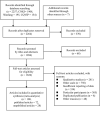Birth Cohort Changes in the Subjective Well-Being of Chinese College Students: A Cross-Temporal Meta-Analysis, 2002-2017
- PMID: 32595554
- PMCID: PMC7300275
- DOI: 10.3389/fpsyg.2020.01011
Birth Cohort Changes in the Subjective Well-Being of Chinese College Students: A Cross-Temporal Meta-Analysis, 2002-2017
Abstract
According to the happiness-income paradox, economic growth within a country does not necessarily lead to an increase in well-being. However, previous literature also showed that economic growth has a greater impact on well-being in a low-income country than a high-income country. China is a typical developing country that has experienced dramatic development in recent decades. How did the well-being of the Chinese change? To examine birth cohort changes in Chinese college students' subjective well-being, a cross-temporal meta-analysis that involved 100 studies was conducted (106 data points, N = 55,830). The results showed that Chinese college students' well-being increased by at least 0.45 standard deviations from 2002 to 2017. In addition, their subjective well-being was significantly correlated with social indicators (e.g., GDP per capita, divorce rate, and university enrollment rate) for the corresponding years and 3 years prior to the collection of subjective well-being data. It is evident that social changes play an important role in predicting changes in well-being.
Keywords: Chinese college students; birth cohort; cross-temporal meta-analysis; social change; subjective well-being.
Copyright © 2020 Su and Liu.
Figures
References
-
- Amato P. R. (2010). Research on divorce: continuing trends and new developments. J. Marriage Fam. 72, 650–666. 10.1111/j.1741-3737.2010.00723.x - DOI
-
- Bai H. M., Xu Y., Zhang R. H. (2009). A study on the relationship between social comparison and subjective well-being of college students. Chin J. Health Psychol. 17, 418–420. Retrieved from https://bit.ly/2ZLRRpw
-
- Bartolini S., Mikucka M., Sarracino F. (2017). Money, trust and happiness in transition countries: evidence from time series. Soc. Indic. Res. 130, 87–106. 10.1007/s11205-015-1130-3 - DOI
-
- Brewer R. (2006). Parental relationships and emotional distress and well-being among college women (Unpublished doctor's dissertation). University of Cincinnati, Ohio, America.
Publication types
LinkOut - more resources
Full Text Sources



